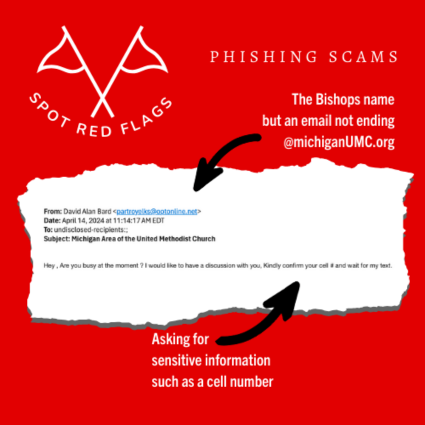Phishing attempts to obtain money or sensitive information are on the rise. Learn how to recognize common red flags in suspicious emails.
In today’s digital age, phishing attempts have become increasingly sophisticated, posing a real threat to individuals and organizations alike. Almost weekly, the Michigan Conference’s communications team receives reports of phishing emails pretending to be Bishop David Bard, aiming to deceive recipients into divulging sensitive information or sending money under false pretenses.

First, it’s important to understand what phishing is. Phishing is a criminal attempt to obtain money or sensitive information, such as usernames, passwords, and financial details, by disguising as a trustworthy email from the Michigan Conference. These criminal emails often appear legitimate, utilizing convincing language and familiar names to deceive unsuspecting individuals.
One notable example of these phishing attempts is the misuse of Bishop David Bard’s name. While the email addresses may appear legitimate at first glance, recipients must look closely at the sender’s email address. Legitimate communications from the bishop or the Michigan Conference of The United Methodist Church would originate with an address ending @michiganUMC.org.
It’s important to be alert to these scams and recognize common red flags in phishing emails. The bishop and conference leaders will never request money or gift cards be sent directly to them instead of the conference treasurer. Additionally, no one will ask individuals to keep their communication secret.
If you are unsure whether a communication claiming to be from Bishop David Bard or conference leaders is legitimate, contact the Michigan Conference’s office by phone at 517-349-4030 or email at [email protected]. Never use the contact information provided in the suspicious email, as it could lead to further exploitation or compromise of sensitive information.
In conclusion, staying alert and informed is critical to protecting oneself from phishing attempts. By remaining vigilant, scrutinizing suspicious emails, and verifying the authenticity of communications, individuals can stop phishing attacks and safeguard their personal and financial information from falling into the wrong hands.
Last Updated on April 15, 2024

